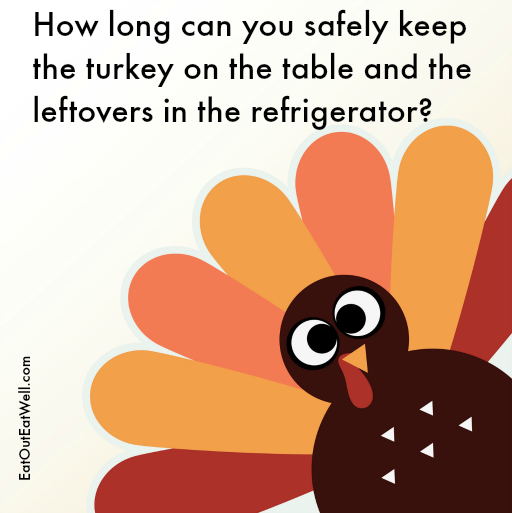The big meal is over and the back and forth to the kitchen for leftovers begins. We all know that leftovers can really bump up the holiday calories, but how do you tell if the leftovers are actually safe to eat?
Once Your Bird Is Cooked, Does It Matter How Long You Leave It Out?
It definitely matters – and the clock starts ticking as soon as the bird comes out of the oven, fryer, or off the grill.
According to the Centers for Disease Control, the number of reported cases of food borne illness (food poisoning) increases during the holiday season.
You shouldn’t leave food out for more than two hours, any time of the year. To save turkey leftovers, remove the stuffing from the turkey cavity, cut the turkey off the bone, and refrigerate or freeze all the leftovers.
The Basic Rules For Leftovers
According to the USDA the mantra is:
2 Hours–2 Inches–4 Days
- 2 Hours from oven to refrigerator: Refrigerate or freeze your leftovers within 2 hours of cooking (taking them off the heat or out of the oven). Throw them away if they are out longer than that. Think about your buffet table – or even your holiday dinner table. How long does the bird, stuffing, and accompaniments sit out as people eat, go back for seconds, and pick their way through the football game and conversation?
- 2 Inches thick to cool it quick: Store your food at a shallow depth–about 2 inches–to speed chilling. Are you guilty of piling the food high in storage containers or in a big mound covered with tin foil?
- 4 Days in the refrigerator–otherwise freeze it: Use your leftovers that are stored in the fridge within 4 days. The exceptions are stuffing and gravy. They should both be used within 2 days. Reheat any solid leftovers to 165 degrees Fahrenheit and bring liquid leftovers to a rolling boil. Toss what you don’t finish.
How Long Can Leftover Turkey Stay In The Freezer?
Frozen leftover turkey, stuffing, and gravy should be used within one month. To successfully freeze leftovers, package them using freezer wrap or freezer containers. Use heavy-duty aluminum foil, freezer paper, or freezer bags for best results and don’t leave any air space. Squeeze the excess air from the freezer bags and fill rigid freezer containers to the top with dry food. Without proper packaging, circulating air in the freezer can create freezer burn – those white dried-out patches on the surface of food that make it tough and tasteless. Leave a one-inch headspace in containers with liquid and half an inch in containers filled with semi-solids.


Leave a Reply